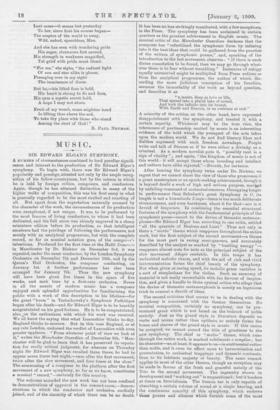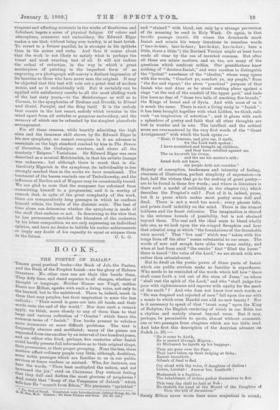MUSIC.
SIR EDWARD ELGA R'S SYMPHONY,
A NUMBER of circumstances combined to lend peculiar signifi- cance and interest to the production of Sir Edward Elgar's symphony. To begin with, there was Sir Edward Elgar'e popularity and prestige, attested not only by the ample recog- nition of his fellow-countrymen, but by the esteem in which he is held by foreign critics, composers, and conductors. Again, though be ha e attained distinction in many of the higher Walks of composition, this was his first essay in what is generally regarded to be the most exalted and exacting of a]l. But apart from the expectation naturally aroused by the character of the work, the circumstances of its production were exceptional, if not unique. It was to be performed by the most fatuous of living conductors, to whom it had been dedicated, and the full score was already engraved in a cheap miniature edition before its production, so that intelligent amateurs had the privilege of following the performance, not merely with an analytical programme, but with the complete record, so far as musical notation goes, of the compw,er's intentions. Produced for the first time at the Halle Concerts in Manchester by Dr. Richter on December 3rd, it was repeated, under the same conductor, by the London Symphony Orchestra on December 7th and December 19th, and by the Queen's Hall Orchestra, the composer conducting, on January 1st. A further performance has also been arranged for January 7th. Thus the new symphony will have been given five times in the space of five weeks, and each time by a first-rate orchestra. Never in all the annals of modern music has a composer enjoyed such splendid opportunities for familiarising the public with a work of this description in his lifetime—for the great "boom" in Tschaikowsky's Symphonic Pathetigue began after his death—and Sir Edward Eiger is to be heartily congratulated on his good fortune. He is to be congratulated, also„on the enthusiasm with which his work was received. We all know the saying that what Lancashire thinks to-day, England thinks to-morrow. But in this case England, or at any rate London, endorsed the verdict of Lancashire with even greater applause. • "From whatever point of view we look at it," writes the Manchester Guardian of December 8th, "Man- chester will be glad to learn that it has preserved its reputa- tion for coolly critical judgment, for whereas on Thursday night Sir Edward Eiger was recalled three times, he bad to appear seven times last night,—once after the first movement, twice after the slow movement, and four times at the close." The summoning of a composer to the platform after the first movement of a new symphony, so far as we know, constitutes a musical "record,"—certainly for this country.
The welcome accorded the new work has not been confined to demonstrations of approval in the concert-room,—demon- strations in which the conductor and orchestra cordially joined, end of the sincerity of which there can be no doubt. It has been no less strikingly manifested, with a few exceptions, in the Press. The symphony has been acclaimed in certain quarters as the greatest achievement in English music. The musical critic of the Manchester Guardian declares that the composer has "refertilised the symphonic form by infusing into it the best ideas that could be gathered from the practice of the writers of symphonic poems," and, speaking of the introduction to the last movement, observes : "[f there is such divine consolation to be found, then we may go through what- ever there is to fear without trembling." Instances of eulogy equally unreserved might be multiplied from Press notices or from the analytical programme, the author of which, dis- carding the more judicious conception of his function,
assumes the immortality of the work as beyond question, and describes it as "a music, deep as love or life, That spread into a placid lake of sound, And took the infinite into its breast, With Earth and Heaven, in an embrace at rest."
A minority of the critics, on the other hand, have expressed disappointment with the symphony, and treated it with a certain asperity. Whichever may be the true view, the vehemence of partisanship excited by music is an interesting evidence of the hold which the youngest of the arts takes upon the modern world. We do not find literary likes and dislikes expressed with such freedom nowadays. People write and talk of Strauss as if he were either a divinity or a criminal. As a modern novelist puts it, "possibly rant is a sign of vitality " ; and again, "the kingdom of music is not of this world : it will accept those whom breeding and intellect and culture have alike rejected,"—Dvortil, for instance.
After hearing the symphony twice under Dr. Richter, we regret that we cannot share the view of those who pronounce it a great masterpiece or an epoch-making achievement, though it is beyond doubt a work of high and serious purpose, tuark,ed by unfailing command of orchestral resource. Occupying longer in performance than Schubert's great Symphony in C, its length is not a himmlische Linge—there is too much deliberate strenuousness, and even harshness, about it for that—nor is it devoid of longueurs. In combining the essential structural. features of the symphony with the fundamental principle of the symphonic poem—resort to the device of thematic metamor- phosis—Sir Edward Eiger has, according to one critic, settled "all the quarrels of Brahma and Liszt." Thus not only is
there a "motto" theme which reappears throughout the entire work, but the first subject of the second movement—a theme for the most part in racing semi-quavers, and accurately described by the analyst as marked by "bustling energy '- reappears almost note for note as the principal subject of the slow movement Adagio cantabile. In this tempo it has undoubted melodic charm, and with the aid of rich and vivid instrumentation forms the chief beauty of the symphony. But when given at racing speed, its melodic grace vanishes in a sort of steeplechase for the violins. Such an economy of material is not easily reconcilable with the fervour of inspira- tion, and gives a handle to those cynical critics who allege that
the device of thematic metamorphosis is merely an ingenious trick to conceal a dearth of ideas.
The second criticism that occurs to us in dealing with the symphony is concerned with the themes themselves. No musical composition, certainly no symphony, can be pro- nounced great which is not based on the bedrock of noble melody. Just as the grand style in literature depends on verbs and nouns rather than epithets, so melody forms the bones and sinews of the grand style in music. If this canon be accepted, we cannot accord the title of greatness to the new symphony. The chief or "motto" theme, which runs through the entire work, is marked nobilmente e semplice ; but its obaracter—so, at least, it appears to us—is sentimental rather than noble, and it owes its effect more to harmonisation and presentation, to orchestral trappings and dynamic contrasts, than to its intrinsic majesty or beauty. The same remark applies to most of the other themes, though an exception may be made in favour of the fresh and graceful melody of the Trio in the second movement. The ingenuity shown in development and "working out" is unquestioned ; but it borders at times on feverishness. The human ear is only capable oe absorbing a certain volume of sound at a single hearing, and the continuous sonority of this symphony, which eschews those pauses and silences which furnish some of the most eloquent and affecting moments in the works of Beethoven and Schubert, begets a sense of physical fatigue. Of colour and atmosphere, ornament and embroidery, Sir Edward Elgar makes a use that, without being ever tawdry, is at least lavish. 'To revert to a former parallel, he is stronger in his epithets -than in his nouns and verbs. And thus it comes about -that the work is not likely to satisfy what is perhaps the truest and most exacting test of all. It will not endure -the ordeal of reduction, in the way in which a great masterpiece of painting in the imperfect form of an • engraving or a photograph, will convey a distinct impression of its beauties to those who have never seen the original. It may be objected that this test will rule out a great deal of modern music, and so it undoubtedly will. But it certainly can be .applied with satisfactory results to all the most abiding work -of the last sixty yearsi—to the Meistersinger as well as to Carmen, to the symphonies of Brahma and Dvor6,k, to Hansel und Gretel, Parsifal, and the Ring itself. It; is the melody that counts in the last resort, melody which remains in the ;mind apart from all suitable or gorgeous embroidery, and the -memory of which can be refreshed by the simplest pianoforte . arrangement.
For all these reasons, while heartily admitting the high ; aims and the immense skill shown by Sir Edward Elgar in his new symphony, we cannot recognise in it an advance in
• essentials on the high standard reached by him in The Dream of Gerontius, the Cockaigne overture, and above all the ;
masterly" Enigma" Variations. Sir Edward Elgar was once • described as a musical Melobisedek, in that his artistic lineage • was unknown ; but although there is much that is dis- tinctively Elgarish in the symphony, its individuality is less . strongly marked than in the works we have mentioned. The - treatment of the basses reminds one of Tschttikowsky, and the ; influence of Berlioz and of Wagner may be occasionally traced. We are glad to note that the composer has refrained from
• committing himself to a programme, and it is worthy of remark that, in spite of the great complexity of the work, -.there are comparatively long passages in which he confines himself within the limits of the diatonic scale. The test of time alone can determine whether the symphony is made of the stuff that endures or not. In demurring to the view that he has permanently enriched the literature of the orchestra by his latest composition we are only expressing an individual
• opinion, and have no desire to belittle his earlier achievements • or imply any doubt of his capacity to equal or surpass them













































 Previous page
Previous page